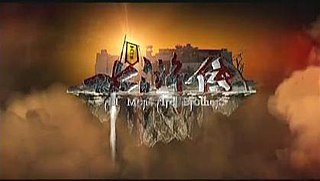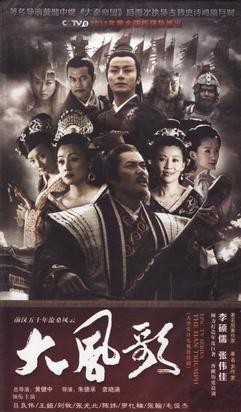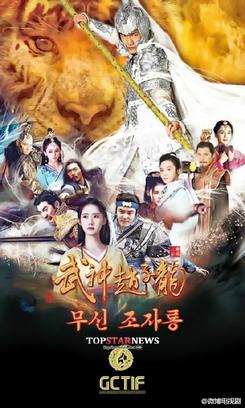
The China Theatre Plum Blossom Award, more commonly the Plum Blossom Award, is the highest theatrical award in China. It is awarded by the China Theatre Association.

Romance of the Three Kingdoms is a Chinese television series adapted from the classical 14th century novel of the same title by Luo Guanzhong. The series was produced by China Central Television (CCTV) and was first aired on the network in 1994. It spanned a total of 84 episodes, each approximately 45 minutes long. One of the most expensive television series produced at the time, the project cost 170 million yuan. It was completed over four years and involved over 400,000 cast and crew members, including divisions of the People's Liberation Army from the Beijing, Nanjing and Chengdu military regions. Some of the dialogue spoken by characters was adapted directly from the novel. Extensive battle scenes, such as the battles of Guandu, Red Cliffs and Xiaoting, were also live-acted.

The Prince of Han Dynasty is a three-season Chinese television series featuring a fictionalised life story of Liu Che, Emperor Wu of the Han Dynasty. Season 1 was first broadcast on Beijing Television in 2001 in mainland China, followed by the second and third seasons in 2003 and 2005 respectively. Except for Huang Xiaoming, who played Emperor Wu in all three seasons, the cast members in each season are almost different from its preceding one.

Three Kingdoms is a 2010 Chinese television series based on the events in the late Eastern Han dynasty and the Three Kingdoms period. The plot is adapted from the 14th century historical novel Romance of the Three Kingdoms and other stories about the Three Kingdoms period. Directed by Gao Xixi, the series had a budget of over 160 million RMB and took five years of pre-production work. Shooting of the series commenced in October 2008, and it was released in China in May 2010.

Royal Tramp is a 2008 Chinese television series adapted from Louis Cha's novel The Deer and the Cauldron. Produced by Zhang Jizhong and Huayi Brothers, the series consists of 50 episodes, filmed in high definition. The series was first broadcast on Jiangsu TV in China in 2008 and was subsequently aired on TVB in Hong Kong and other countries.

The Water Margin is a 1998 Chinese television series adapted from Shi Nai'an's classical 14th-century novel of the same title. It was produced by CCTV with Zhang Jizhong as producer. It was first broadcast in China in January 1998. The series also featured action choreography by Yuen Woo-ping.

All Men Are Brothers is a 2011 Chinese television series adapted from Shi Nai'an's 14th century novel Water Margin, one of the Four Great Classical Novels of Chinese literature. The series is directed by Kuk Kwok-leung and features cast members from mainland China, Taiwan and Hong Kong. The series was first broadcast on 8TV in March 2011 in Malaysia.

The Han Triumph, also known as Wind Ode, is a Chinese television series based on historical events in the early Han dynasty, beginning with the founding of the dynasty by Liu Bang after his triumph over Xiang Yu, and the events leading to the reign of Liu Heng. Directed by Huang Jianzhong, the series starred Ray Lui, Wang Ji, Liu Mu, Zhang Guangbei, Chen Wei and Li Qingxiang in the leading roles. It was first broadcast on CCTV-8 in China on 17 December 2011.

Justice Bao is a Chinese TV series starring producer Jin Chao-chun as the Song dynasty official Bao Zheng. The series ran for 3 seasons from 2010 to 2012. In addition to Jin, Kenny Ho, Fan Hung-hsuan and Lung Lung again reprise their iconic roles from the 1993 Taiwanese hit Justice Pao and the 2008 Chinese series Justice Bao.

Tang Ming Huang is a Chinese television series based on historical events in the reign of Emperor Xuanzong of the Tang dynasty. The series was directed by Chen Jialin and starred Liu Wei as the eponymous emperor. It was first broadcast on CCTV-1 in 1990 in mainland China.

Wu Zi Bei Ge, also known as Wu Zi Bei Ge: Wu Zetian Zhuan, is a 2006 Chinese television series based on the life of Wu Zetian, the only woman in Chinese history to assume the title of "Empress Regnant". The series was directed and written by Chen Yanmin, and starred Siqin Gaowa and Wen Zhengrong as the empress. The series' title Wu Zi Bei Ge literally means "Song of the Uncharactered Stele", with the "stele" referring to the unmarked one standing near Wu Zetian's tomb at the Qianling Mausoleum.
Records of Kangxi's Travel Incognito is a Chinese television series revolves around the Manchu-ruling Qing Empire monarch Kangxi Emperor and the corruption he faces as he tries to make the government run efficiently. The series was directed by Zhang Guoli and produced by Deng Jie. The series consists of a total of 144 episodes shot in high definition, each 45 minutes long. The series is based on the events in the Kangxi era of the reign of Kangxi Emperor during the Qing Dynasty. The series also features Kangxi Emperor's family member and entourage in prominent roles and storylines, most notably his Concubine Yi and eunuch Sandezi and Buddhist monk Fayin, and Concubine Yi's servant girl Xiao Taohong. The program originally aired from 1998 to 2007, spanning five seasons and 144 episodes. For the first four seasons, the show starred Zhang Guoli and Deng Jie as Kangxi Emperor and Concubine Yi respectively. In the last season, John Lone and Irene Wan became the stars.

Heroes of Sui and Tang Dynasties 1 & 2 is a 2012 Chinese historical television series directed by Li Hantao. It was first aired on Hunan Television in China in 2012. The series is based on the events in the reign of Emperor Yang of Sui during the Sui dynasty and Tang dynasty. The series stars Dicky Cheung, Winston Chao, Liu Xiaoqing, Yu Shaoqun, Wezei, Kou Hsi-Shun, Yoki Sun, Jang Seo-hee, and Lan Yan. It is followed by the sequel Heroes of Sui and Tang Dynasties 3 & 4.

The Seven Heroes and Five Gallants is a 1994 Taiwanese television series produced by Chinese Television System (CTS) a few months after its prequel Justice Pao, which was also produced by Chao Ta-shen. Dozens of actors appeared in both series, but only Sze Yu and Tu Man-sheng reprised their roles. Fan Hung-hsuan and Lung Lung chose to portray new characters rather than their iconic roles.

Su Dongpo is a 2012 Chinese historical TV series produced by China Central Television. It was first shown in 2012, although it was filmed in 2007.

God of War, Zhao Yun, also known as Chinese Hero Zhao Zilong, released under the title Dynasty Warriors in Indonesia, is a 2016 Chinese television series directed by Cheng Lidong and produced by Zhejiang Yongle Entertainment Co., Ltd. The series starred cast members from mainland China, South Korea and Taiwan: Lin Gengxin, Im Yoon-ah and Kim Jeong-hoon. The story is loosely adapted from the 14th-century Chinese classical novel Romance of the Three Kingdoms, with Zhao Yun as the main character. It was first aired on Hunan TV from 3 April to 7 May 2016.

The Great Emperor in Song Dynasty is a 2015 Chinese historical TV series directed by Gao Xixi, starring Chen Jianbin as Emperor Taizu of Song who founded the Song dynasty and reunified most of China proper.
Dongfang Shuo is a 2008 Chinese historical and biographical television series centered on Dongfang Shuo, a Han dynasty scholar-official, fangshi, author, and court jester to Emperor Wu. It is based on the novel Wisdom Holy Dongfang Shuo by Dongfang Longyin. The series was jointly by China Central Television, Beijing Film Academy and Guangdong Donghexing Recording and Video Company. The series stars Cheng Qian as Dongfang Shuo, the rest of the main cast includes Jin Dong, Hu Ke, Qin Hailu, Yu Xiaowei, Liu Xiyuan, Hu Yajie, Tao Huimin, and Zhang Lingxin. It originally aired on CCTV-8 in August 2008.
















